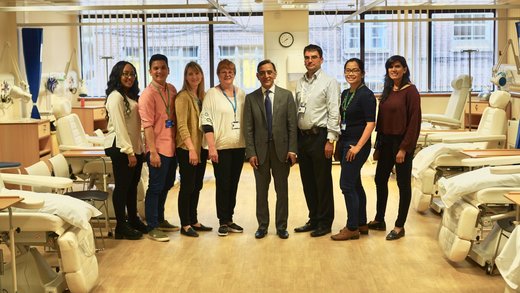New clinical trial recruits record number of patients
A new clinical trial for Myelodysplastic Syndromes recruits a record number of patients at King’s College Hospital.
Myelodysplastic Syndromes  (MDS) are a group of blood disorders that cause a drop in the quality and quantity of healthy blood cells. It is a type of bone marrow failure and is most common in people over 65 years-of-age. Only 20% of people with MDS are younger than 50.
(MDS) are a group of blood disorders that cause a drop in the quality and quantity of healthy blood cells. It is a type of bone marrow failure and is most common in people over 65 years-of-age. Only 20% of people with MDS are younger than 50.
Having MDS can lead to becoming dependent on blood transfusions and carries an increased risk of developing acute myeloid leukaemia (AML), a cancer of the white blood cells.
MDS covers a variety of sub-types of the disease which vary in severity, from very low-risk, to very high-risk, with significant differences in prognosis for each level.
There are a number of treatment options for MDS, ranging from ‘supportive care’ to more active treatments for the intermediate or high-risk types. But many patients also need to rely on regular blood transfusions, and most suffer from fatigue, sometimes bruising and/or repeat infections.
The only cure for MDS is a stem cell transplant and this is reserved for younger or fitter patients as the treatment can be quite taxing. Given that the majority of patients with the condition are over 65, a more targeted and less invasive form of therapy is much needed to improve treatment options. This is where an increase in world-wide research activity and clinical trials is very welcome and fills a much needed purpose.
The King’s College Hospital Haematology Trial team has recently become the top global recruiter to a promising phase three clinical trial investigating the use of an experimental drug called Luspatercept as a targeted drug therapy for MDS. Luspatercept is aimed at one of the specific sub-types of MDS called RARS (Refractory Anaemia with Ringed Sideroblasts).
The drug targets the body’s TGFb (transforming growth factor beta) pathway, which is involved in many cellular processes, including playing an important role in growth, development, inflammation and even in tissue repair.
In this international clinical trial, Luspatercept was compared to a placebo to reduce or stop the transfusion requirements of MDS patients.
The Haematology trials unit at King’s College Hospital managed to invite and enroll the highest number of patients to this international trial, recruiting more patients than any other hospital in the world. Lajos Floro, Senior Trial Fellow at the Department of Haematology in King’s College Hospital, said:
Congratulations to everyone who contributed to this achievement and a special thank you to our Clinical Trials Facility for all their help in running the trial. This is a fantastic achievement for King’s College Hospital and will benefit all our MDS patients.
Our Department of Haematology is very proud to be leading the way in engaging and involving patients with our research and we will continue to improve our knowledge of why MDS occurs and how best to treat it.
For more information on MDS for patients, please check mdspatientsupport.org.uk
For more information on MDS for physicians/haematologists, please check ukmdsforum.org.uk